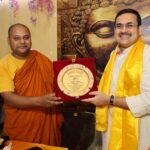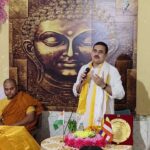A Great and Passionate Love for Bharatmata – tribute to Dr. Syama Prasad Mookerjee
- By : Anirban Ganguly
- Category : Articles
In his tribute to Syama Prasad Mookerjee, one of the tallest leaders of modern India, Acharya J.B.Kripalani, expressed and articulated the emotions of millions of his countrymen when he movingly wrote, ‘I wish to record the great and passionate love that he had for Bharatmata and her unity. Only political diehards can deny this. It was this passionate love for his country that made him resign his seat in the Bengal Cabinet in 1942 as a protest against the cruel repression of a foreign government. It was this love that again made him resign his seat in the Central Cabinet under the first Congress government in free India, on the issue of the treatment of Hindus in Pakistan and their exodus to India. It was, I believe, the love for the unity of India that made him participate in the Jammu agitation which unfortunately cost him his life and deprived the nation of his services.’
It was this ‘great and passionate love’ for Bharatmata that essentially defined Syama Prasad’s public life and unfailingly propelled his actions. It is only the ‘political diehards’, for whom the term and vision of ‘India’s national interest’ is non-existent, who have consistently worked to suppress, misrepresent or create a cleverly crafted miasma of falsehood around Syama Prasad’s legacy and life.
From the beyond passage of time, of decades and of our collective memory, Syama Prasad still stands out as a sentinel against that mindset which seeks to dissolve and dilute the essential and civilisational vision of our existence as a nation and a people. Each time therefore his legacy is reiterated, every time he is invoked, whenever attempts have been made to seriously examine the many facets of his life these ‘political diehards’ have always rallied around pounding their maces of falsehood. Prominent among these today are the worshippers and propitiators of a crass culture of vote-bank politics.
For Syama Prasad, as he himself once described it, ‘separatism and constriction’ are both banes of our national life and have therefore to be resisted, opposed and arrested. It was this driving philosophy that saw him take positions which now in hindsight only prove his prescience and foresight – qualities that only perhaps Sardar Patel and a few other leaders of that era demonstrated in great measure.
To those who came in touch with him and worked with him either in their political, official and educational capacities, Syama Prasad was the leader – exuding a deep insight and attention for details, an indefatigable energy for sustained work and application, a deep understanding of human issues and political problems, Syama Prasad endeared himself to people cutting across divides and ideologies. As one of his associates observed, ‘unlike most ambitious men, he had a very warm heart for his friends – in fact, for anyone in distress.’ It was these qualities combined with a deep connect with his people that led him to undertake the huge famine relief initiative during the genocidal Bengal famine of 1943. When comrades and collaborators were busy spinning tales, subverting and trying to douse the final conflagration of our fight to freedom, Syama Prasad resigned his seat in the Bengal cabinet and plunged wholeheartedly in this final struggle. ‘His patriotic mind’, noted Asutosh Lahiry a towering nationalist leader, ‘revolted against the manner the ‘Quit India’ movement was being suppressed…unspeakable atrocities were being committed’ and Syama Prasad felt ‘he could no longer associate himself with an Administration which perpetrated such crimes.’ His letter of resignation ‘was a historic document, and constituted a scathing indictment of the British administration of the time.’
As the legendary art historian and philosopher O.C. Ganguly (1881-1974) who had worked closely with Syama Prasad in the University of Calcutta wrote, ‘his sincere patriotism and championship of the people’s causes are illustrated in his work as Minister in the Bengal Cabinet and as Minister of Commerce in the Central Cabinet. He never cared for well-paid offices and posts for realising personal ambition and profit, but several times resigned from the posts of Minister as soon as he found that he could not support the prevailing cabinet policy, because it happened to go against the interest of the common people.’
A young Deputy Secretary in his ministry at the Centre, for example, observed how ‘his cheering smile and unfailing courtesy had endeared him to all his Officers and men who ungrudgingly worked long hours daily feeling that to be associated with such a man was indeed a great fortune and honour. His clarity of thought could hardly be surpassed and many difficult problems relating to his Ministry he would solve with almost uncanny ease. While his officers and men worked hard for him, he worked even harder so that work in his Ministry may be disposed of promptly.’
Yet it was his continuing connect with his people, his adherence to his commitment which gradually turned Syama Prasad, especially in the last phase of his political life, into a truly pan-Indian leader, one who could challenge the status quo and dare to create a new narrative of national regeneration. In those heady days of Nehruvianism such an act was often seen as fallacious and chimerical by the cautious and calculating.
Perhaps O.C. Ganguly sums best, the life of one he so closely observed, ‘As an eminent educationist, as an ardent champion of Hindu Culture, as a distinguished litterateur, as a passionate and sincere patriot, as a friend and champion of the oppressed and down-trodden, as an able Parliamentarian, as an eloquent orator, as a devoted servant of the people, and, above all, as a Humanist, the name of Dr. Syama Prasad Mookerjee will go down in the pages history as one of the most distinguished figures that adorned and illuminated the variegated firmament of contemporary India.’
Syama Prasad continues to appeal and inspire those whose life and work revolve around the vision of a sovereign, self-reliant, self-possessed image of India…
















